- Home
- Elizabeth Gaskell
Sylvia's Lovers Elizabeth Cleghorn Gaskell Page 2
Sylvia's Lovers Elizabeth Cleghorn Gaskell Read online
Page 2
In looking back to the last century, it appears curious to see how little our ancestors had the power of putting two things together, and perceiving either the discord or harmony thus produced. Is it because we are farther off from those times, and have, consequently, a greater range of vision?… But such discrepancies ran through good men's lives in those days. It is well for us that we live at the present time, when everybody is logical and consistent. [p. 66]
A diachronic notion of ‘progress' or ‘improvement' may be illusory, she implies.
By the time that she was writing, fears of social revolution in England, fuelled by the unrest on the Continent during the 1840s (and referred to in Mary Barton and North and South) had largely disappeared, but the individual's relation to authority and to ever-growing institutional and state power remained as much a matter of concern as ever. It is perhaps not coincidental that John Stuart Mill's treatise on these questions, On Liberty, was also published in 1859, although it is uncertain whether or not Gaskell actually read it. In setting her story in the 1790s against a background of disruptive events, Gaskell is reminding her readers of the fragility of social equilibrium and the constant tensions between duty and desire, and between adherence to preconstructed codes and the assertion of individual autonomy. These tensions are problematized even more acutely because sited in a period and region of greater lawlessness than Gaskell's present, an arena where personal will and ideological restraint are more crudely opposed, and, as she frequently points out, less mediated by introspection or self-analytical debate.
The framing events of the novel exist on two levels – national (the Napoleonic wars) and local (the press-gang activities in Monkshaven). The two are consequentially linked: it is because of the wars on the Continent that impressment must be used to obtain more sailors for battle service. They are also linked in terms of narrative structure: the operations of the press-gang both take Kinraid away and precipitate Daniel Robson's fatal intervention, leaving Sylvia broken-spirited and defenceless against Philip's insistent courtship; the wars themselves not only provide Kinraid with the opportunity of raising his status but are also the means of reconciliation between him and Philip on the battlefield at Acre.
More importantly, the novel interconnects the historical and the personal, the public and the private. It is a story of basic human passions and individual choice, foregrounded within the compass of larger outer circumstances. Private behaviour, focusing on personal desire in conflict with restricting conditions, is paralleled by public events in which questions of general good are set against the anarchy of disruptive action. Significantly, the two come together most clearly in the often-criticized scenes at Acre in which Philip's rescue of the wounded Kinraid – a deed of reparation for his previous treachery – resonates against the larger-scale bravery enacted in Sir Sidney Smith's bold defence of the fort and eventual routing of the French forces. A similar, though differently orientated, parallel is evident in the sections concerning the press-gang, in which the lawlessness of personal outrage which erupts in vengeful violence is juxtaposed with the merciless operations of impressment which illegally seizes on protected whalemen. Here, of course, both occurrences are problematic, since each brings into question the degree to which the maintenance of hegemonic order can be justified at the expense of a more personal and humanely motivated value system.
As well as examining the interconnections between private and public within a historical framework, Gaskell develops her narrative concerns in the context of gender. Sylvia's Lovers is as much about personal relationships as about historical events. Indeed, in its penetrating analysis of marital disharmony and the competing pressures of duty and inclination within the sexual sphere, it foreshadows George Eliot's more extensive study of the same themes in Middlemarch, written seven years later. From this angle, not only does the retrospective temporality of Gaskell's novel remind readers of the changed – and changing – roles of men and women, with a mediating narrator negotiating between past and present, but the gendered differences of behaviour are examined through the intersection of individual action and historical forces.
In her textual representation of these differences, Gaskell anticipates later psychoanalytical and feminist theorists who argue for a gender specific (though not necessarily biologically essentialist) temporality: ‘male' time as a linear dimension, a striving towards some predetermined aim or plan which is progressive and finite; ‘female' time as a more subjective process, cyclical and repetitious, linked to bodily rhythms and encompassing a dimension of infinity.
Gaskell's portrayal of character and its relation to outer processes reflects these distinctions. In the novel, men are involved in the linear temporality of history – war, politics and public events; they drive towards finality or conclusion, assured of a knowable and finite causal connection between act and consequence. Women, in contrast, exist in a non-conclusive, non-linear dimension, signalled by privacy and by their exclusion from the external world of action. This is not shown as a fixed opposition: the emphasis in the novel on the natural world and the cyclical movement of the seasons, as well as the way in which patterns of male and female behaviour shift and overlap, suggests an essentially harmonizing view, a belief in accommodation and reconciliation. Nevertheless, in contrasting gender roles and characteristics, Gaskell is foregrounding ‘difference' both as an ideological construct and as a determining force.
The centrality of men in history is established in the first chapter, in the opening focus on the male occupation of whale fishing, and in the following section of the narrative which sets the story against the background of the Napoleonic wars and the consequent activities of the press-gang. By pointing to the strong link between sailors of all classes and the unified spirit of resistance to any infringement of personal liberty, Gaskell foregrounds the male-orientated world of action which operates according to a linear temporality. The notion of manly ‘doing' directed towards some specific end is most clearly articulated in Chapter IX, in which Charley Kinraid and Daniel Robson describe their whaling adventures in the Arctic, exploits based on real-life undertakings.20 It is also visually represented earlier in the novel, when Molly and Sylvia, on their way to town to sell their produce, stop to look at the view out to sea:
On this blue trackless water floated scores of white-sailed fishing boats, apparently motionless, unless you measured their progress by some land-mark; but still, and silent, and distant as they seemed, the consciousness that there were men on board, each going forth into the great deep, added unspeakably to the interest felt in watching them. [p. 18]
The biblical allusion here highlights the importance of such activity, which suddenly reaches tragic dimensions when the returning whalers are seized by the press-gang.
Against this background of conflictual and externalized action the male characters operate in a public sphere, seeking to effect change or to insert themselves into historical processes. At the same time, they are linguistically empowered, in the enabling arena of patriarchal discourse. They have access to the public medium of words not only through oratory – Robson incites the rioters by his impassioned speech, as Sir Sidney Smith urges on his men at Acre – but also through reading and writing. With no amorous feelings for her cousin to inspire her, Sylvia has no interest in these skills and fails to respond to Philip's laboured and largely unsuccessful attempts to teach them to her. Her mother, however, sees their worth, associating them with the acquisition of property (p. 103).
At one end of the spectrum of this masculinity is Daniel Robson, whose involvement with outer events is at the level of anarchic individualism. Denying the mediating idea of nationalism, he voices a direct challenge to the tyrannies of authoritarianism, as he tells Philip: ‘“Nation here! nation theere! I'm a man and yo're another, but nation's nowheere,”’ (p. 42). His intervention into the progress of events by inciting the rioters and encouraging violent resistance to the press-gang results in disaster and is truly death-orientated; y
et ironically, for all his apparent miscalculation, he does inscribe himself into history as a martyr, a symbol of defiant individualism represented in the narrative not without some admiration. At the same time, however, such violence is shown as destructive not only of family relationships but also of the self: ‘His face became a totally different countenance with the expression of settled and unrelenting indignation, which his words called out' (p. 52). This hatred becomes obsessional, and even his sympathizers see it as ‘a supernatural kind of possession, leading him to his doom' (p. 233).
Charley Kinraid represents the more progressive aspect of assertive masculinity. His whaling exploits render him a glamorous and admired figure, while his capacity to turn apparent disaster to his advantage is shown by his ascension through the naval ranks, from impressed sailor to captain. His determined opportunism becomes evident when he is captured by the press-gang:
His soul was beating itself against the bars of inflexible circumstance; reviewing in one terrible instant of time what had been, what might have been, what was. Yet while these thoughts thus stabbed him, he was still mechanically looking out for chances. [pp. 201–2]
Significantly, while he is contemplating a regressive temporality (‘what had been, what might have been‘) which seems to offer him no choice, almost instinctively he seeks to convert it into a new, self-determined future. His opportunistic drive towards specific goals operates also in the romantic sphere. Confident of winning Sylvia and of his continuing influence over her, he accommodates his involvement with her to the conditions of the wider, outer world: the two spheres are not oppositional. In manipulating circumstances to his own ends in the private as well as the public arena – hints of his earlier flirtations are succeeded by the rapid transferral of his thwarted love for Sylvia to another, materially more substantial, object of affection, ‘Miss Clarinda Jackson, with a fortune of 10,000l.’ (p. 396) – he embodies a forward movement of successful achievement.
Philip Hepburn seems at first to be far less representative of stereotypical maleness. Generally regarded as somewhat unmanly because he works in a draper's shop, in a town dominated by a traditionally masculine employment (Daniel Robson comments, ‘ “thou'rt little better nor a woman, for sure, bein' mainly acquaint wi' ribbons”’ (p. 192), he does not approve of iconoclastic individualism. He argues that the press-gang is acting for the good of the country as a whole, and, alarmed at anarchic impulses, he dissociates himself from revolutionary activity, a position reinforced by his Quaker affiliations (and the pacifism of Quakerism itself is seen as antithetical to an obvious masculinity). He is, too, far more trapped in the private world of love than is Kinraid, as is shown in his circular self-debate about whether or not to abandon his hitherto unsuccessful courtship of Sylvia:
It was better to give it up altogether and at once. But what if he could not? What if the thought of her was bound up with his life; and that once torn out by his own free will, the very roots of his heart must come also? [p. 149]
This is as obsessional as Robson's hatred of the press-gang, but in its focus on a-historical, inward-directed desire it may be seen as more female- than male-orientated.
Yet Philip has an influential place in the outer world. He operates in the commercial sphere, becoming a business partner of the Fosters, and eventually, with William Coulson, taking over the shop; trusted by the two brothers, he goes to London on their behalf, ‘quietly laying the foundation for enlarging the business in Monkshaven' (p. 210). He, too, can be opportunistic even when it seems that his life is ‘being shaped for him' (p. 190), and he is also to some extent capable of separating his personal from his public commitments – depression about his relationship with Sylvia in no way interferes with his successful trade negotiations. Indeed, as the narrator somewhat wryly points out, access to external activity, as for all of his sex, provides a relief from inner troubles:
Even with the most domestic and affectionate men, their emotions seem to be kept in a cell distinct and away from their actual lives. Philip had other thoughts and other occupations than those connected with his wife during all this time. [p. 325]
Philip is also capable of acting decisively. He is involved in the aftermath of the riots, working on Robson's behalf, taking Bell and Sylvia to see the accused in prison, and reporting on the proceedings at York Assizes. Furthermore, albeit unintentionally, he enters into the linear temporality of history when, as a recruited soldier, he takes part in the siege of Acre; his action on the battlefield not only contributes to a decisive historical moment, but, through his rescue of Kinraid, unites him with the traditionally male world of the former specksioneer.
Set against this outward-directed maleness is the very different dimension of femaleness. Women in the novel exist outside history; they are largely passive victims of male forces and have their own private, inner world which touches on but does not activate the outer public one. While their menfolk venture on the perilous trade of whale fishery, they wait at home for their return and listen to tales of their exploits. A recurrent image is of Bell and Sylvia sitting at the farm listening for sounds of Robson as he comes back from news gathering in Monkshaven; their most agonizing vigil is that which is never relieved, after the case has gone against him and he is condemned to death. Similarly, when Sylvia goes to her favourite cliff nook to meditate and to watch the ships, her thoughts do not extend to the wider sphere beyond, ‘to where they were bound to, or what strange places they would penetrate to before they turned again, homeward bound' (p. 102). No more can she penetrate the mysterious male outer world into which Kinraid seems to have gone when he returns to sea, passed ‘out of her sight into the thick mist of unseen life from which he had emerged' (p. 108).
Women are also powerless to change the external course of events: when the homecoming sailors are seized, they can only scream and weep – as Philip tells Sylvia, ‘“it's the law and no one can do aught against it, least of all women and lasses”’ (p. 31). Cut off from the reports of war and politics which are centred on the public house, they are unaffected by national events: to Sylvia and her mother, ‘a little bit of York news, the stealing of a few apples out of a Scarborough garden that they knew, was of far more interest to them than all the battles of Nelson and the North' (p. 92). Women are also excluded from the commercial world, the most notable example being Hester Rose, whose sex debars her from being offered a share in the Fosters' business. As Jeremiah Foster explains to Coulson and Philip:
‘We have not thought it necessary to commend Hester Rose to you; if she had been a lad she would have had a third o' the business along wi' yo’. Being a woman, it's ill troubling her with a partnership; better give her a fixed salary till such time as she marries.’ [p. 163]
The novel presents the female sphere as one of both disempowerment and positive influence. As has been indicated, women may spur on their men to deeds of resistance, but they themselves do not directly participate; they experience the consequences of action rather than initiating it. They exist under the omnipotence of male dominance, having internalized the notion of female subordination. Bell Robson thinks that women should ‘go through life in the shadow of obscurity,—never named except in connexion with good house-wifery, husband, or children' (p. 115); her feelings of inferiority have so coloured her outlook that she cannot find fault with Robson, even when he betrays his paternal responsibility by exposing Sylvia to vulgar gaze in the Admiral's Head:
She really believed her husband to have the serious and important occupation for his mind that she had been taught to consider befitting the superior intellect of the masculine gender; she would have taxed herself severely if, even in thought, she had blamed him. [p. 118]
Bell, of course, is an extreme instance of female self-deprecation. Other women, like the acerbic Alice Rose, the boldly self-assertive Molly Corney or even Hester in her quieter way, are more sceptical of patriarchal pretensions. Even these, however, are dependent on a masculine order which assigns them a secondary role.
Women also operate here within an essentially non-linear temporality. Unlike the men, whose gaze extends outwards as they construct and act on a future for themselves, the women dream of a past or a ‘might have been‘. Hester, for instance, wistfully though hopelessly imagines Philip as her husband, while Sylvia, cocooned in the glow of her newly aroused love for Kinraid, sits down ‘to meditate and dream about her great happiness in being beloved by her hero‘, her visionary constructions inuring her to all apprehensions of forthcoming tragedy – ‘no fear of the cold, glittering icebergs bearing mercilessly down on the Urania, nor shuddering anticipation of the dark waves of evil import, crossed her mind' (p. 193). After he disappears, presumed drowned, she desperately clings to the past, trying to reconstruct that ‘bright, handsome face, that face which was fading from her memory, overtasked in the too frequent efforts to recall it' (p. 244).
Later, when Sylvia's married life has become more and more of a torture to her, her imprisonment in the timeless circularity of her emotions – she hardly lives in the present at all – becomes almost intolerable. Significantly, the only peace she finds is out of doors, away from the restricting patriarchal environment of the dark house; she takes her baby ‘to the freedom and solitude of the sea-shore… here, she was as happy as she ever expected to be in this world' (p. 327). In a passage reminiscent of Matthew Arnold's ‘Dover Beach’,21 the restless flux of her internal feelings is signified in natural imagery:
she would sit down on a broken piece of rock, and fall to gazing on the advancing waves catching the sunlight on their crests, advancing, receding, for ever and for ever, as they had done all her life long—as they did when she had walked with them that once by the side of Kinraid.

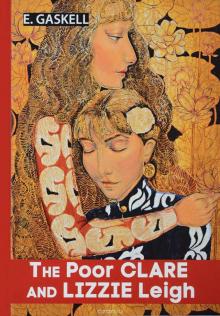 Lizzie Leigh
Lizzie Leigh The Poor Clare
The Poor Clare Lois the Witch
Lois the Witch North and South
North and South Sexton's Hero
Sexton's Hero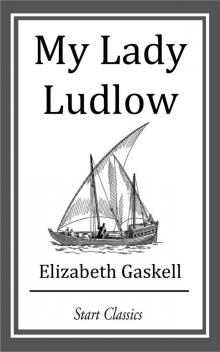 My Lady Ludlow
My Lady Ludlow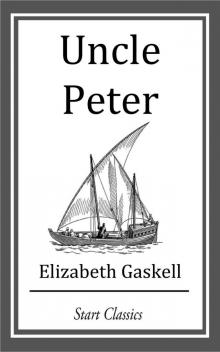 Uncle Peter
Uncle Peter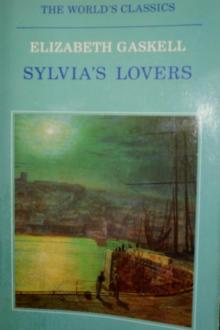 Sylvia's Lovers Elizabeth Cleghorn Gaskell
Sylvia's Lovers Elizabeth Cleghorn Gaskell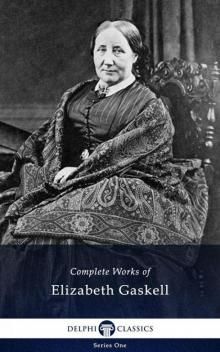 Delphi Complete Works of Elizabeth Gaskell
Delphi Complete Works of Elizabeth Gaskell The Grey Woman
The Grey Woman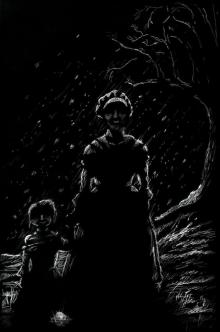 The Old Nurse's Story and Other Tales
The Old Nurse's Story and Other Tales Cranford
Cranford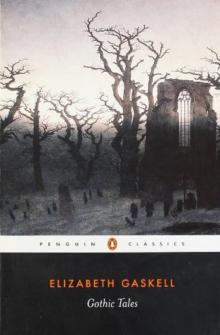 Gothic Tales
Gothic Tales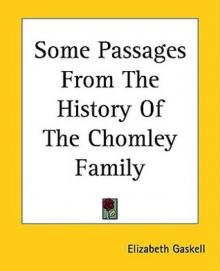 Some Passages From the History of the Chomley Family
Some Passages From the History of the Chomley Family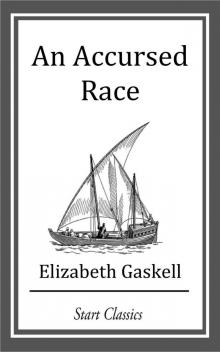 An Accursed Race
An Accursed Race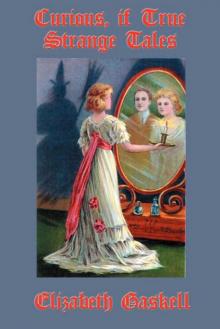 Curious, if True: Strange Tales Elizabeth Cleghorn Gaskell
Curious, if True: Strange Tales Elizabeth Cleghorn Gaskell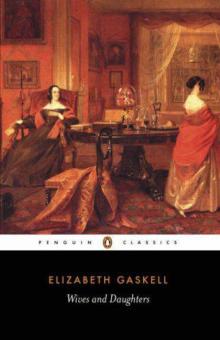 Wives and Daughters
Wives and Daughters The life of Charlotte Brontë
The life of Charlotte Brontë